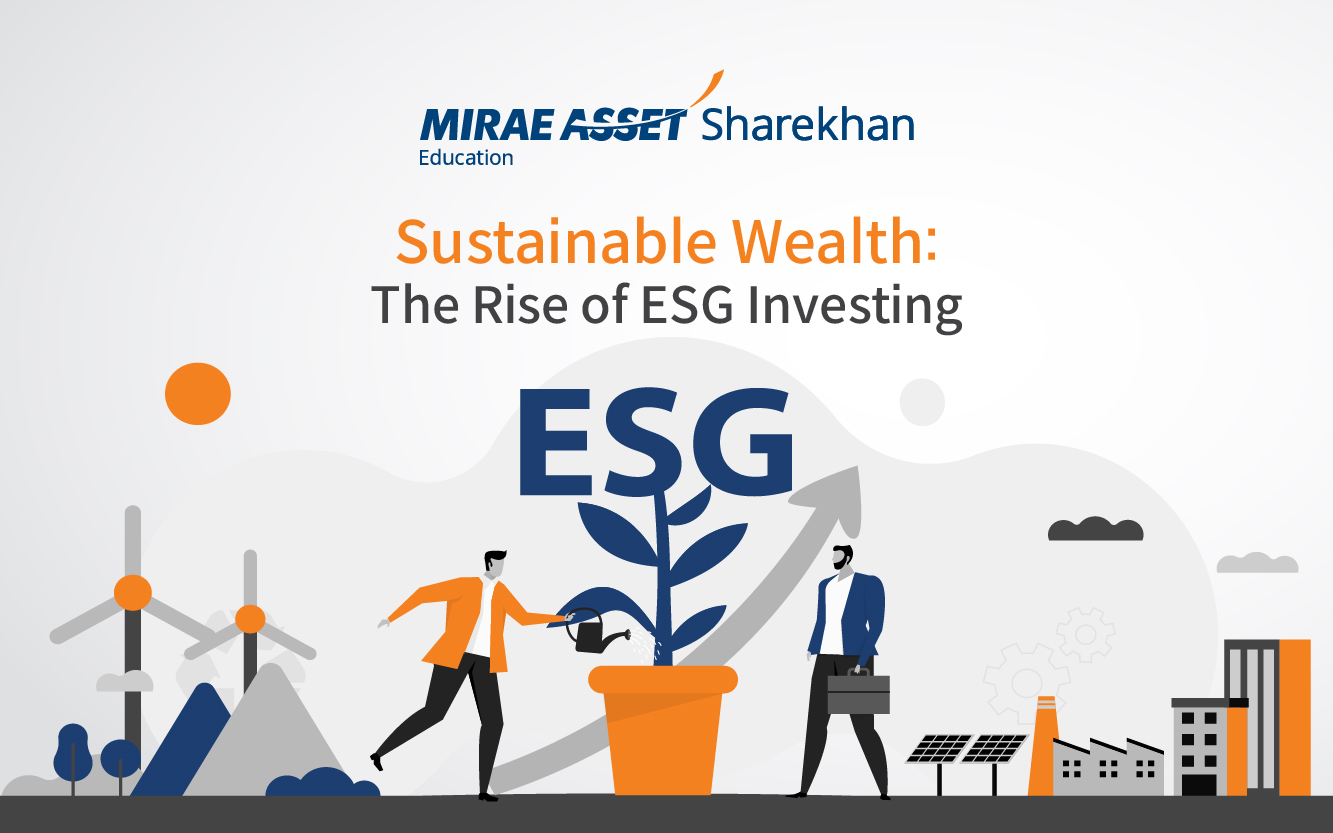Sustainable Wealth: The Rise of ESG Investing
Published by Sharekhan Education | November 27, 2024

ESG investing involves integrating environmental, social, and governance factors into the investment decision-making process, in addition to traditional financial considerations. Many investor groups including endowment funds and pension funds, observe their role as more than just return-seekers. They manage significant pools of capital. They make a conscious decision to favour investments that score better on ESG parameters.
Understanding ESG Factors
Environmental factors:
Environmental factors pertain to the effects a company has on the natural surroundings. This encompasses concerns such as pollution (toxic chemicals, packaging, carbon emissions, and other waste), the impact on biodiversity and the use of natural resources (land & water). It also includes efforts to reduce environmental footprints, such as eco-friendly agriculture and energy efficiency.
Social Factors:
Social factors pertain to aspects that impact people— customers, employees or society as a whole. These include issues such as labour standards for workers throughout the supply chain, employee health & safety, and privacy & data security for users. Additionally, investors increasingly expect companies to demonstrate a proactive commitment to equal access to products & services for all social groups, addressing inequality & discrimination and ensuring fair treatment of employees.
Governance Factors:
Governance factors pertain to a company’s ability to conduct its business responsibly. This includes adhering to ethical standards, such as maintaining tax transparency and implementing anti-corruption policies. It also encompasses traditional corporate governance concerns, such as upholding the quality of financial disclosures, managing conflict of interest, ensuring board diversity & independence, and ensuring fair treatment of minority shareholders.
Why ESG Investing Matters
ESG investors seek to buy shares in companies that show a commitment to improving their performance across environmental, social, and governance areas. This approach allows investors to align their investment decisions with their personal values. By assessing ESG factors, investors obtain a comprehensive understanding of the companies they support, which helps them reduce risks and identify new growth opportunities.
Impact Across Sectors:
ESG considerations are impacting different sectors in varied ways. For example, renewable energy companies are well-positioned due to their strong environmental emphasis, while traditional industries like manufacturing are facing increased scrutiny. We are witnessing the rise of independent third-party agencies offering ESG ratings, along with the introduction of new ESG indices globally for portfolio benchmarking.
The Global Growth of ESG:
Trillions of dollars are now managed globally under ESG framework. Over the next two decades investment funds to the tune of $50 trillion are expected to come under ESG fold. Franklin Templeton anticipates that, in the future, all investing will be driven by ESG principles.
Indian’s ESG Committed:
India has committed to reaching net-zero emissions by 2070, as declared at COP26. Additionally, SEBI has enhanced ESG compliance requirements, mandating that the top 1,000 listed companies by market capitalization submit detailed reports that include disclosures on environmental, social, and governance factors. NSE IFSC has introduced an International Sustainability Platform, India’s first-of-its-kind ESG platform, at GIFT IFSC. This platform will enable the listing and trading of various sustainability products, such as Voluntary Carbon, Sustainable Bonds, Green REITs, and Green Equity, helping to direct sustainable finance into India.
The ESG movement in India has gained momentum in recent years, fuelled by several factors, including the politicization of ESG, growing awareness of climate change and its potential impact on businesses, economies, & societies. A growing middle class with increasing disposable income and a desire for more ethical consumption. Additionally, banks are increasingly performing ESG due diligence before providing financing to companies.
Indian Companies Leading ESG Efforts
Indian companies are recognizing that strong ESG performance can boost their global competitiveness and open up access to international markets. Infosys, a global leader in next-generation digital services and consulting, has been a pioneer in implementing sustainability initiatives. The company achieved carbon neutrality in 2020, 30 years ahead of the target set by the Paris Agreement. HDFC Bank, one of India’s largest private sector banks, has made notable progress in ESG by prioritizing financial inclusion, sustainability, and strong governance practices. One of the best ways to invest in companies with the good ESG Score is Mirae Asset Nifty 100 ESG Sector Leaders ETF.
Indian cement companies are below global peers on carbon footprint, with 0.56 t of CO₂ per ton of cement production, vs the global average of 0.61. The lower emissions by Indian cement companies are largely on account of their higher blending ratios (higher mixing of fly ash and steel slag) which reduce the consumption of clinker. Dalmia and ACC are leading the pack, with CO₂ per ton of only 0.46 and 0.47, respectively.
Gravita India has firm focus on ESG. It essentially runs ‘waste to wealth’ operations with lead recycling as the major source of revenue. The company, through circular sustainable business model, endeavours to segregate and sort scrap materials with rigorous quality inspection. It has well defined short-, medium- and long-term goals focusing on all the facets of ESG framework such as reduction in energy intensity, water intensity, and usage of Renewable Energy power.
Organizations centered on ESG principles will be better positioned to build resilient, sustainable, and impactful businesses in the years to come.
Conclusion
As ESG investing continues to grow globally and in India, investors who align their portfolios with companies committed to sustainability will be better equipped to achieve long-term wealth. With the increasing focus on environmental, social, and governance factors, retail investors have an opportunity to not only contribute to a better world but also ensure their investments reflect forward-thinking strategies.
For those looking to deepen their understanding of ESG investing, Sharekhan Education offers a free webinar. Discover how ESG can be a powerful driver of sustainable wealth and learn how to incorporate these factors into your investment strategy.
Disclaimer
Investment in securities market are subject to market risks, read all the related documents carefully before investing. For detailed disclaimer and registered office details visit link –
https://www.sharekhan.com/disclaimer/Sharekhan_Education.html




